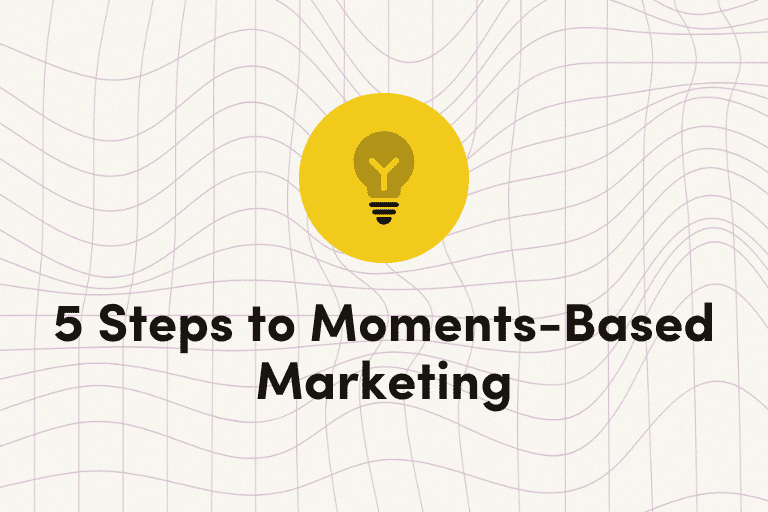Valentine’s Day may be over, but as long as some of us have dark chocolate hidden under our beds, we can still talk about romance.
And romance takes work. Ideally, we would love the perfect meet-cute where we waltz into a coffee shop, lock eyes with the shopkeeper, and run off into the sunset holding hands. That’s easy. That’s fun. But in reality, most chance encounters are likely to lead to rejection, not romance.
So why are we talking about relationships when we should be focusing on customers?
Because today’s customers expect more from the brands they do business with. They expect to be treated with respect. They want to be seen as more than a number or a conversion.
And this is exactly where the concepts collide. To make a connection, you have to approach the customer relationship like you would a romantic relationship.
Win Over Customer Hearts and Minds
This month, the teams at Tinuiti and Iterable got together for a webinar on customer relationship advice: “Win Customers’ Hearts and Minds with a Personalized Email Strategy.” We discussed trust, brand ethics and customer sentiment, as well as how personalization and connection manifest as a result. If you want to learn the application of a relationship-building strategy, be sure to watch the recording!
In the meantime, here’s the TL;DR on the topic, so you can get back to building relationships and creating content.
The Top 8 Tenets of the Customer Relationship
1. Trust
For consumers and their personal data, trust has arguably become the top priority. After all, four out of five consumers say they need to be able to trust a brand in order to buy from them.
The ideal customer experience bakes trust into every message and interaction. Foster that trust by combining data with contextualized communications.
2. Transparency
Consumers are smart: They do their research and explore their options. And when they share their data with brands, they expect transparency on how it will be used.
Whether you’re collecting insights from their purchase history or asking them to share their interests and preferences, be open about how you’ll enhance their customer experience with this information.
Once customers recognize the value of a personalized experience, they will be more willing to continue reciprocating that transparency with you.
3. Conversation
Imagine you are on a first date. They ask how your day was, you elucidate, and then you wait…and wait. Nothing.
The key to a thriving customer relationship is getting comfortable with the concept of conversation. It’s ensuring that your marketing campaign is infused with check-ins, follow-ups and other forms of feedback loops. It’s promising when customers tell you how they feel about a product, you listen and take action. It’s about knowing what’s going on in their lives and seeing how you can support them.
The best relationships are a back and forth, not one-sided.
4. Empathy
Your partner may not feel the same way about things as you. As a result, you can practice mindfulness and pay close attention to their emotions. Your emotional intelligence is a guiding principle in developing the right tone.
Practice empathy in marketing. There’s an actual person who opens, reads and processes your emails, texts, push notifications and the like. Recognizing that is not just the right thing to do—it also impacts the bottom line. Brands that deliver humanized experiences are twice as likely to outperform the revenue growth of their competitors.
Our customers have different lived experiences and values. We have to listen to and learn from them. That’s the only way we talk with—not at—them.
5. Passion
“What do you like to do in your free time?” It’s a pretty common question when you’re getting to know someone. But when you really take a look at the core of the inquiry, you realize what you’re actually asking is, “What are you passionate about?”
Today’s audiences want to know a brand’s beliefs and values. They want to shop with brands that share their passions.
And by leveraging zero- and first-party data, brands can better identify what resonates with their customers and align their messaging accordingly.
6. Authenticity
Authenticity is integral to building thriving customer relationships. 71% of consumers say that they prefer to buy from companies that embrace their values, but folks can tell when they’re just being pandered to.
For a brand to be considered authentic, its communications need to be perceived as real, reliable and respectful. But you can’t just talk the talk—you have to walk the walk by truly standing by what you proclaim to care about.
These days, platitudes are cheap, but commitments are what customers deserve.
7. Artificial Intelligence (AI)
It’s really difficult to read someone’s emotions. Understanding how your partner feels can help build stronger bonds. The same goes for customers: How they feel about your brand, in real-time and across channels, can inform smarter communication strategies.
Using AI, marketers gain a unique advantage by being able to intelligently translate customer engagement into deeper, more meaningful connections.
8. Personalization
Personalization is formed from dynamic relationships using a one-to-one approach that appeals specifically to each individual. Personalization happens when you have access to and utilize various profile, behavioral, and lifecycle data points to create user-specific experiences.
The end result? A marketing campaign that meets your customers exactly where they are, with what they want to see, when they want to see it.
Customer Relationships 101
There’s no single strategy or one-message fits-all formula to ensure that your relationships—either personal or professional—last for the long haul. It takes time to build rapport with others. And the same goes for marketing.
But the beauty of marketing is that you can experiment, analyze and adjust your campaign messaging and strategy along the way. Keeping these eight tenets in mind enables you to build a lasting—and individualized—relationship with each customer.
Learn more about how to win customers’ hearts and minds with personalization by watching our recent webinar with Tinuiti.
































